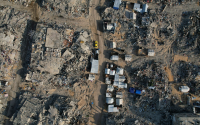16 January 2006The HinduSiddharth Varadarajan
In the next few weeks, the Manmohan Singh Government will face its second major test on the Iranian nuclear front. For the United States and its European allies appear determined to refer Teheran to the United Nations Security Council for pursuing a civilian nuclear energy programme in defiance of Washington's diktats. The provocation for the latest western hysteria is Iran's decision to conduct research experiments on uranium conversion and other aspects of the civilian nuclear fuel cycle. These experiments are taking place in facilities that are fully safeguarded by the International Atomic Energy Agency (IAEA). Moreover, these activities are in no way prohibited under either the Nuclear Non-proliferation Treaty (NPT) or Iran's Safeguards Agreement with the IAEA, published by the Agency as Infcirc 214.
Article 4 of Infcirc 214 states: "The safeguards provided for in this Agreement shall be implemented in a manner designed: (a) To avoid hampering the economic and technological development of Iran or international co-operation in the field of peaceful nuclear activities, including international exchange of nuclear material; (b) To avoid undue interference in Iran's peaceful nuclear activities, and in particular in the operation of facilities; ... "
It is worth noting that Infcirc 214 — the primary legal covenant governing relations between Iran and the IAEA — explicitly rules out the Agency doing anything that might hamper Iran's technological development in the field of peaceful nuclear activities. Conducting research and experiments on the nuclear fuel cycle clearly falls under this category. Nevertheless, the U.S. as well as Britain, France, and Germany (the so-called European-3 or E-3) now want the IAEA Board of Governors to convene on an emergency basis with the aim of referring Iran to the UNSC for the crime of being in non-compliance with its safeguards obligations.
Under the Safeguards Agreement, Iran is obliged to accept safeguards "on all source or special fissionable material in all peaceful nuclear activities ... for the exclusive purpose of verifying that such material is not diverted to nuclear weapons or other nuclear explosive devices." On its part, the IAEA has "the right and obligation" to ensure that safeguards are applied on all such activities "for the exclusive purpose of verifying that such material is not diverted to nuclear weapons or other nuclear explosive devices." Over the years, Iran (like South Korea, Taiwan, Egypt and a few other countries) had failed to report to the IAEA — and hence ensure safeguards upon — a number of nuclear-related transactions and activities.
These instances were thoroughly investigated by the Agency's inspectors and the relevant files on these closed. Thus in his report to the IAEA Board of Governors on September 2, 2005, Director General Mohammed el-Baradei noted that "all the declared nuclear material in Iran has been accounted for, and therefore such material is not diverted to prohibited activities." Dr. el-Baradei said, however, that the IAEA was not yet in a position to conclude that there were no "undeclared" nuclear activities taking place in Iran — an obligation that stems not from the safeguards agreement but only from the Additional Protocol that Iran said it would voluntarily adhere to in 2003.
Despite this finding, the Board of Governors — acting under the pressure of the U.S. and the E-3 — voted on September 24 last year to find Iran in non-compliance with its safeguards agreement in the context of article XIIC of the IAEA Statute. Conveniently overlooked was the fact that article XIIC, as well as articles 18 and 19 of Infcirc 214, define non-compliance essentially as diversion of safeguarded material for prohibited purposes, something Dr. el-Baradei had explicitly ruled out. As a sop to countries uncomfortable with the manner in which the Iranian question was being unduly politicised, the board decided to keep in abeyance the timing of the referral of Iran to the U.N. Security Council mandated under XIIC. However, this sop was meant only as a temporary expedient to be withdrawn at the first convenient moment. And that moment, as far as Washington is concerned, has now arrived.
Given the current composition of the 35-member Board of Governors, the U.S. should have no difficulty in garnering the votes needed to send the Iran docket to the Security Council. Though what will happen after is anyone's guess, the U.N.'s experience with Iraq suggests that coercion and punitive measures do not help matters when it comes to allaying international concerns about the possible presence of illegal nuclear weapon-related facilities in any given country. In Dr. el-Baradei's words, the IAEA is not yet in a position to declare that Iran has "no undeclared nuclear activities or facilities." If the IAEA's inability to make such a declaration were to become grounds for reporting a country to the Security Council and threatening it with sanctions, no less than 106 countries would have to be put in the dock because they have either not signed or not yet ratified or implemented the Additional Protocol.
If the aim is to ensure Iran has no undeclared nuclear activities — an urgent and laudable aim, one might add — the best way to accomplish it is to ensure the continuation of IAEA inspections. Sites suspected of hiding clandestine facilities could be targeted for surprise or short-notice inspections. But if the aim is to maintain the veil of ambiguity as a future casus belli, referring Iran to the UNSC would be the logical step to take because Washington is desperate to "trap" Teheran into severing its links with the IAEA or declaring it will no longer allow inspections — the one route through which its innocence can be established.
For the Manmohan Singh Government, the latest drive to refer Iran to the UNSC and impose sanctions as punishment poses a particularly difficult legal and political challenge. In September last year, India voted for the IAEA resolution but also provided an "explanation of vote" in which it stated that it did not believe Iran was in non-compliance or that the Iranian nuclear programme had given rise to questions that were within the competence of the Security Council. Nothing has happened since September to invalidate these two reservations.
If anything, the November 2, 2005, report of Dr. el-Baradei was reasonably upbeat on Iranian cooperation, which was why the E-3 wisely decided not to press for an immediate Security Council referral. And the resumption of safeguarded nuclear research — though marking an end to Iran's voluntary, self-imposed suspension of all fuel cycle-related activity — can hardly be called a violation of IAEA safeguards.
One could, at best, question Teheran's political wisdom in choosing to end this suspension at the present time but not its sovereign right to do so. If India's vote against Iran last year surprised the world and created a political storm at home, voting again now would make a mockery of the country's formally stated positions and question, once again, the Government's commitment to an "independent foreign policy."
This week, when U.S. Undersecretary of State Nicholas Burns arrives in New Delhi, the Iranian issue is likely to figure almost as prominently as the planned separation of India's civilian and military nuclear facilities. Though motivated by larger strategic considerations, last July's landmark U.S.-India deal on civilian nuclear cooperation is also inextricably linked to the Iran question as far as the Bush administration is concerned.
In a press conference on January 6, U.S. Secretary of State Condoleezza Rice could not have been more explicit about the linkage when she was asked about the reasons why the nuclear deal with India was so important to Washington: "We can't say to the Indians on the one hand, you can't — we'd rather you weren't — engaged in energy relations with, for instance, Iran, but by the way, civil nuclear is closed off to you."
Apologists for the first IAEA vote against Iran last September say that if the Americans are insisting on an `either-or', it is in India's interest to choose nuclear cooperation with Washington over hydrocarbons from Iran. What they do not realise is that a country of India's strength has the political and diplomatic ability to get both. What they also do not realise is that the slightest indication of Indian willingness to allow the U.S. to dictate its strategic choices will only lead to Washington trying to extract even more.
India's vote against Iran, for example, led the U.S. to try and impose new conditions that ran counter to the letter and spirit of the July 18 nuclear agreement. Among these were the demand that India accept in-perpetuity safeguards and give up its claims — as recognised in that agreement — to exactly the same rights and obligations in the nuclear field as the U.S. With the negotiations on civilian-military nuclear separation keenly poised, the Manmohan Singh Government should resist the temptation to blink for the second time.






